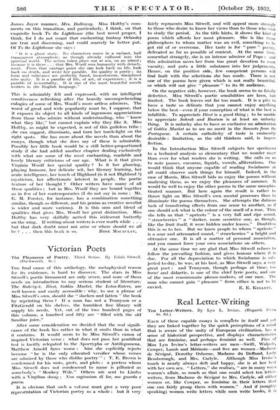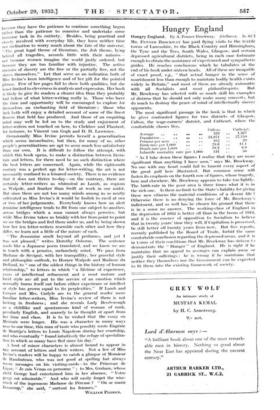Real Letter-Writing Ten Letter - Writers. By Lyn L. Irvine. (Hogarth Press.
• 8s. Bd.)
EACII of these capable essays is complete in itself and yet they are linked together by the quick perceptions of a mind that is aware of the unity of European civilization, has a sense of historical perspective, and displays characteristics that are feminine, and perhaps feminist as well. Five of Miss Lyn Irvine's letter-writers are men—Swift, Walpole, Cowper, Lamb and Merimee—and five are women—Madame de Sevigne, Dorothy Osborne, Madame du Deffand, Lady Bessborough, and Mrs. Carlyle. Although Miss Irvine's touch is nearly always deft and happy, she is at her best with her own sex. -" Letters," she realises,•" are in many ways women's affair, so much so that one could select ten letter- writers, from Madame de Sevigne to Mrs. Carlyle,- all either women or, like Cowper, so feminine in, their letters that one can fairly group them .with women." • And if (roughly speaking), women. write letters while men write books, it is
because they have the patience to continue something begun rather than the patience to conceive and undertake some immense task in its entirety. Besides, being practieal and closely involved with everyday life, they have neither time nor inclination to worry much about the fate of the universe, " The great legal theme of literature, the Job theme, lying behind all tragedies, accords little with their natures-j- not because women imagine the world justly ordered, but because they are too familiar with injustice. The active enemies of slavery are the free or the partially free,' not the slaves themselves." Let that serve as an indication both of Miss Irvine's keen intelligence and of her gift for the pointed phrase. Few of her pages fail to show both qualities, but she is not limited to cleverness in analysis and expression. Her book is likely to give its readers a clearer idea than they probably had before of what letter-writing really is. Those who have the time and opportunity will be encouraged to explore for themselves an enchanting field of literature ; those who lack both will enjoy a detailed account of some of the finest flowers that field has produced. And those of an enquiring mind may well be led on to the study and enjoyment of letter-writers not touched on here, to Chekhov and Flaubert, for instance, to Vincent van Gogh and D. H. Lawrence.
Occasionally Miss Irvine permits herself a generalization which seems inconclusive, but then, for many of us, other people's generalizations are apt to seem much less satisfactory than our own. It is difficult to follow the attempt, with which this book opens, to make a distinction between litera- ture and letters, for there need be no such distinction where the best letters are concerned. Again, while the eighteenth century was a perfect age for letter-writing, the art is not necessarily confined to a leisured society. There is no evidence that it does not thrive to-day--on the contrary, there are certainly letter-writers as whimsical as Lamb, as copious as Walpole, and franker than Swift at work in our midst. But since there are not too many minds among us so neatly cultivated as Miss Irvine's it would be foolish to cavil at one or two of her judgements. Everybody knows how an alert feminine intelligence tends to flit from one subject to another, across bridges which a man cannot always perceive, but while Miss Irvine takes us briskly with her from point to point we see the bridges and feel them under us, and by being shown how her ten letter-writers resemble each other and how they differ, we learn not a little of the nature of each.
" The Jessomine smelt beyond all perfumes, and yet I was not pleased," writes Dorothy Osborne. The sentence reads like a Japanese poem 'translated, and we know we arc in touch with a pensive, melancholy mind. We pass from Madame de Sevigne, with her tranquillity, her graceful style and philosophic outlook, to Horace Walpole and Madame du Deffand, to " one of the oddest things in the history of human relationship," to letters in which " a lifetime of experience, years of intellectual refinement and a most mature and lucid style are all put to the service of an emotion which normally burns itself out before either experience or intellect or style has grown equal to its perplexities." If Lamb and Cowper and Mrs. Carlyle are to the general reader more familiar letter-writers, Miss Irvine's review of them is not lacking in freshness ; and she reveals Lady Bessborough as a childlike and spontaneous kind of woman of rank, peculiarly English, and scarcely to be thought of apart from her time and class. It is to be wished that the essay on Merimee were longer. His was a character in many ways near to our time, this man of taste who possibly wrote Eugenie de Montijo's letters to Louis Napoleon during her courtship, and who eventually " found intuitively the refuge of specializa- tion to which so many have fled since his day."
A host of minor characters is almost bound to appear in any account of letters and their writers. Not a few of Miss Irvine's readers will be happy to catch a glimpse of Monsieur de Rambuteau, who was not good at spelling but always Wrote messages on his visiting-cards—to the Princesse de Ligne, " Je suis Venus en persorme " ; to Mrs. Graham, whose child George had entertained him in her absence, " Votre gorge est admirable." And who will easily forget the wise- crack of the ingenuous Madame de Pereuse ? " On se marie beaucoup;" she said, " surtout les femmes."













































 Previous page
Previous page